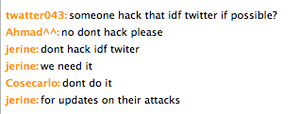Overview
#OpIsrael is an Anonymous-led raid to to protest Israel’s Operation Pillar of Defense[1] by taking down Israeli government websites through distributed denial of service (DDoS) attacks.
Background
In early November 2012, the Israel Defense Forces took to Twitter to live-update about the status of the fight in Gaza. On November 14th, IDF killed Ahmed Jabari, the chief of Hamas’ military wing, in an airstrike. Being the highest ranking Hamas official to be killed by the IDF since the 2008 Gaza War, the news of Jabari’s assassination quickly escalated tensions between the two sides.
The IDF has begun a widespread campaign on terror sites & operatives in the #Gaza Strip, chief among them #Hamas& Islamic Jihad targets.
— IDF (@IDFSpokesperson) November 14, 2012
On November 15th, Anonymous-affiliated blog Anon Relations[2] claimed that Israel’s government had publicly threatened to cut off Gaza’s internet access and called for an attack on the country’s most important websites in retaliation. The post included a “care package” file in both English and Arabic containing the press release, first aid instructions, a proxy to hide the user’s IP addresses, a technical guide on how to get around an internet access ban and a image file of the Anonymous seal.
Notable Developments
On November 15th, a Pastebin file[5] containing more than 650 web addresses defaced as part of the operation was created by Anonymous Grupo. Additionally, another Pastebin file[6] was created to collect useful information for those in Gaza, including links to the care packages, cell phone apps, medical information, livestreams, news links and dial-up internet access numbers, among other resources. The same day, a modified version of the previous day’s communique was posted to YouTube by Gigabytedrop and a Twitter account[3] and Facebook fan page[4] were launched with the designated hashtag for the movement: #OpIsrael.
On the 18th, it was reported that Anonymous members had leaked the personal information of more than 5000 Israeli officials.[15] However, as of 8:30 PM EST on November 19th, the link leads to a 404 page on Engelhardt Consult, a Denmark business site. By the 19th, Israel’s Finance Minister Yuval Steinitz claimed the country had blocked more than 44 million cyber attacks on government websites.[16]
News Media Coverage
Beginning on the 15th, internet culture blogs and news sites ncluding BetaBeat[7] and WebProNews[8] began covering Anonymous’ operation. Over the next four days, additional coverage of the cyberattack appeared on Breitbart[9], Cnet[10], Forbes[11], the Daily Dot[12], Vice[13] and Fox News.[14]
Online Reaction
On November 15th, Redditor twolf1 submitted a post titled “Anonymous warns Israel: ’No one cuts internet on our watch” to the /r/worldnews[17] subreddit, which received over 5,300 up votes and 780 comments with the next four days. Many commenters criticized the report linked in the post, arguing that Anonymous was a nebulous entity with no central leadership. The same day, Redditor HouseSpeaker submitted a post titled “Anonymous is on it: Israel threatens to cut Gaza off from the Internet, telecommunications, ‘NO ONE shuts down the Internet on our watch’” to the /r/anonymous[18] subreddit.
Criticisms
On November 19th, 2012, the tech news blog Gizmodo[19] published a post titled “Anonymous is Losing its War Against Israel,” comparing the attacks to “egging someone’s house.” The article dismissed the group’s indiscriminate targetting of any website with an Israeli domain, which ended up taking down mostly small businesses, and the leaking of “Israeli supporter” personal information as largely ineffective. The article also included several screen shots from the hacker group’s IRC channel, arguing that the communications were disjointed and chaotic (shown below).
Search Interest
External References
[1]Wikipedia – Operation Pillar of Defense
[2]Anon Relations – #opIsrael – Anonymous stands by Palestine in this time of war and grief
[3]Twitter – @Op_Israel
[5]Pastebin – Mass defaced #OpIsrael #GazaUnderAttack
[6]Pastebin – OpIsrael Info Update: 11/15 (23:58 GMT + 0:00)
[7]BetaBeat – Anonymous Launches #OPIsrael in Response to Israel’s Live-Tweeted Attack on Gaza
[8]WebProNews – Anonymous Commences #OpIsrael To Protect Internet In Gaza
[9]Breitbart – Anonymous Launches #OpIsrael in Retaliation for Gaza Strikes
[10]Cnet – Anonymous targets Israeli Web sites in protest over Gaza
[11]Forbes – Anonymous Hackers Ramp Up Israeli Web Attacks And Data Breaches As Gaza Conflict Rages
[12]Daily Dot – Anonymous takes down hundreds of Israeli websites in #OpIsrael
[13]Vice – The Gaza Strip Cyber War
[14]Fox News – Hackers target Israel with millions of attacks as Hamas rockets continue to fall
[15]RT – Anonymous leaks personal information of 5,000 Israeli officials
[16]Yahoo! News – Israel claims to have ‘deflected 44 mln cyber-attacks’ since start of Gaza offensive
[17]Reddit – Anonymous warns Israel – No one cuts internet on our watch
[18]Reddit – Anonymous is on it – Israel threatens to cut Gaza off from the Internet

